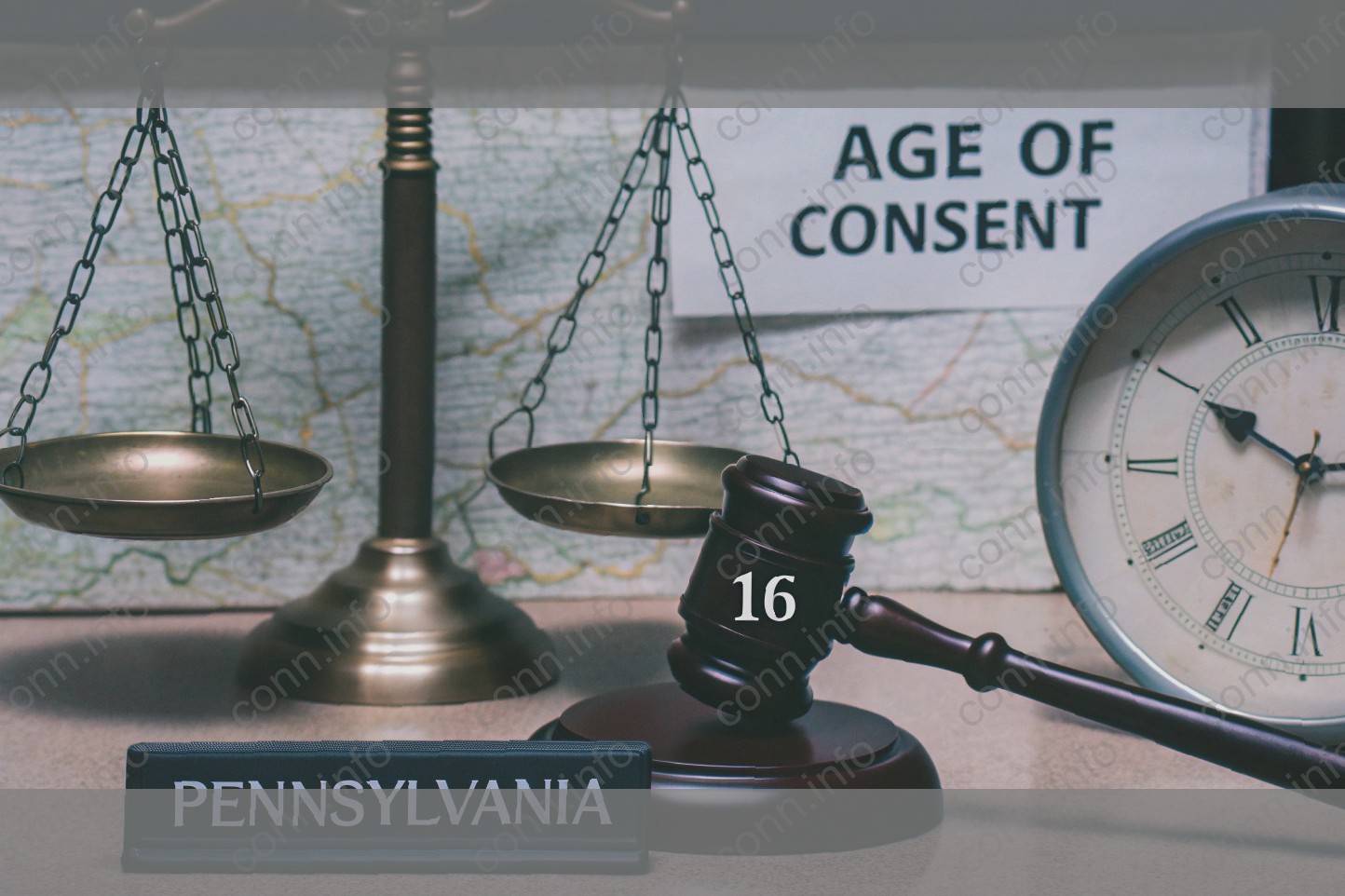Pennsylvania Age of Consent
In Pennsylvania, the legal age of consent under the law is 16 years old. The statute reads that a "person commits an offense if he or she engages in sexual intercourse with another individual; or deviate sexual intercourse with another individual which is not his or her spouse, and the other individual is less than 16 years of age." This can result in fines and up to two years in prison upon conviction.
This is significant as it overrides any parental consent for sexual activity, as consent from the minor (or minor parents) is not a defense to this offense. There are some exceptions. For example, an individual under the age of 16 cannot be convicted for sexual activity if the other individual is also under the age of 16 , and both individuals are within four years of age.
In these cases, it is possible to establish as a defense that the two parties "mistakenly believed in good faith" that they were married to each other at the time of the incident, or that they were legally permitted to marry each other.
If someone under 18 years of age is charged with violating the age of consent, they may be taken to juvenile court if their lawyer pursues this option. If the case is tried in juvenile court, the process is similar to a family court. A judge and not a jury will decide how they will be punished for the alleged sexual activity, and if their behavior is considered to have been misguided but otherwise well-meaning, they could potentially avoid jail time and other consequences.

Ages in a Relationship
The current law in Pennsylvania states that the state may not legally penalize a person for engaging in an intimate relationship with another individual who is no less than 11 years younger or no more than 11 years older than them. For example, if a 17-year-old with a birthday at the end of the year in question slept with a 28-year-old, there would be no issue of law or violation of the age gap provision. If the complainant in a statutory rape case is 13 years old, however, the person they had sex with must be age 18 or older and therefore only 5 years older.
In cases that involve minors, the concepts of consent change quite a bit, as anyone who has had sexual relations with a minor could potentially face criminal charges, including statutory rape, regardless of their own age. When a minor is involved, the state sees it as a crime rather than a violation of the law. When analyzing age differences in relationships, the state does not simply consider the ages of the two individual people. It also looks at the relationship and the people’s respective knowledge of each other, the level of affection they share and a variety of other factors before making any determination on whether a violation has occurred.
While the state of Pennsylvania will prevent criminal charges from occurring based on an age gap, if a party is seeking to obtain a divorce based on an "irretrievable breakdown" of marriage, a judge will likely assess the validity of the complaint based in part on the coupling’s age differences. This does not mean that you will certainly win your divorce due to an age difference between yourself and your spouse, but it could be a factor that is taken into account when determining whether or not you were in a valid and healthy marriage.
Pennsylvania Romeo and Juliet Law
In Pennsylvania, the Romeo and Juliet law exists to reduce the penalties associated with unlawful sexual conduct involving minors when there is only a minor age difference. The law applies to those aged 13 to 17. In order to qualify for immunity from prosecution, both parties must be at least that age. That means that if one of the two partners is at least 13 years old, but the other is 12, the law does not apply. In order to qualify, the victim must have been at least 13 years old and must not have been more than four years younger than the accused.
The law was created to avoid consequences for couples that were compatible for reasons other than their age. For example, if a 19-year-old and a 20-year-old are dating, they are in the same age range, and this is in no way concerning or unusual. However, if one of those partners is only 15 years old, it becomes illegal. The law is there to serve as a buffer zone so that unlawful sex between two reasonably aged high schoolers does not have long-term negative legal impacts.
To qualify, the sex must be consensual, voluntary and not include any force, coercion or fraud. If one party, who is 13 or older, would claim that the sex was non-consensual, it would not fall under the immunity of the Romeo and Juliet law.
This law, however, will not exonerate someone who is aged 21 and has sex with a 14-year-old. It is likely to not matter was a cause of death.
Criminal Charges and Penalties
The criminal charges and legal consequences for violating legal age gap laws in Pennsylvania can be serious. In most circumstances, a violator will face misdemeanor charges for sexual offenses involving a person that is significantly younger or older than them. It is important to note that there are a number of other offenses where age gap laws could apply, like corruption of minors, which is a felony in Pennsylvania. In addition, the offender could find themselves registered with the sex offender registry in Pennsylvania. The list of sex offenders contains detailed information about those who have been charged with the crime, such as their name, address, photograph, date of birth, physical description, and more. Although there are some exceptions, violating legal age gap laws is typically a misdemeanor offense in Pennsylvania . The possible penalties could include any number of the following: As you can see, the penalties for violating age gap laws in Pennsylvania can vary quite a bit, depending on the circumstances. For example, a sexual encounter with a minor could be charged as a felony if there is a significant age difference between the offender and the victim. As such, it is important for anyone who has been charged with violating age gap laws to consult an experienced criminal defense attorney right away. Often times, a sexual encounter will be charged with statutory rape. However, there are other potential defenses, too. That is why it is critical for defendants to work with skilled attorneys to get the best possible outcome in their case.
Parental Consent and Emancipation in PA
In addition to legal suspicions of criminal activity, the application of parental consent laws and the possibility of emancipation for minors in age-disparate relationships may impact the determination of whether a relationship is unlawful. For instance, under Pennsylvania law, minors can apply to be emancipated from their parents or guardians. If a minor becomes emancipated, he or she can generally engage in contracts and conduct business on their own, without parental consent. In the context of an age-disparate dating relationship, emancipation shows that a minor "acts as an adult" and, therefore, may influence the courts as to whether he or she can consent to an age-disparate dating relationship.
However, it should be noted that the Commonwealth does not necessarily recognize emancipation as a channel through which to grant the authority to marry. Pennsylvania law, as amended in 2004, sets forth the statutory minimum ages to marry and the procedures required to authorize a marriage that is otherwise forbidden by law. The amended law no longer includes a provision which allowed a court to authorize the marriage of a minor upon a finding of emancipation or opinion by a physician that marriage was necessary because of the minor’s pregnancy.
Additional consideration may also be given to the role of parental consent laws. Here, criminal statutory provisions relating to incest of less than first cousins require parental consent if a minor is involved. These laws state the following: The offense is a felony of the third degree if one of the parties to the offense is a minor and the other is neither a minor nor the parent or guardian of the minor and the minor’s parent consents to the offense after being informed of all the facts of the matter. (18 Pa.C.S. § 4302.)
Lawyer Resource
To navigate the complex web of age gap laws in Pennsylvania, seeking legal counsel from a competent attorney experienced in family law matters is highly recommended. A qualified legal professional can provide tailored advice based on your specific situation, help you assess the potential risks and benefits, and guide you in making informed choices . It’s essential to be cautious about relying solely on online resources, as they may not address your unique circumstances. A good first step in finding legal advice is to call your local Bar Association – many Bar Associations in Pennsylvania have lawyer-referal services that can help direct you to someone who’s qualified to help you with your specific concerns.


